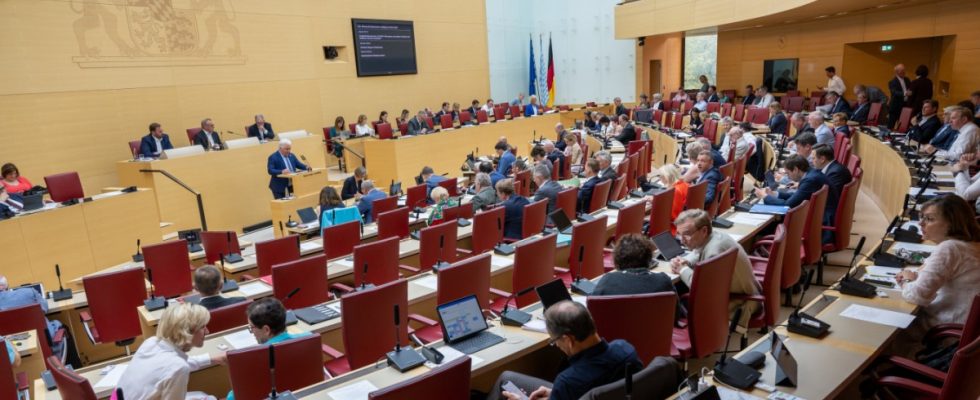Almost at the very end, a lone fighter comes to the lectern. The other day, last session of the state parliament of this election period, the last application consultation before the election – it’s about a teacher concept of the FDP. The non-attached MP Michael Busch – who left the SPD in the summer of 2022 – is allowed to speak, after him it will only be the turn of the Minister of Education. He wanted to get rid of a few thoughts from the point of view of a non-attached MP, says Busch. And attested to the parliament as a whole “disrespectful scolding” instead of finding solutions to complex issues. As a non-attached person, he no longer had to look for reasons why he tactically rejected an application, but why he agreed to a good idea; like here in his eyes from the FDP. Busch describes this way of doing politics as “liberating”.
He even gets approval for the speech, a clapping of his hand on the table, from Markus Söder. The prime minister also wanted to pay tribute to the person Busch was a district administrator in Coburg for ten years before moving into the Maximilianeum in 2018. He will no longer be a member of the next state parliament, like the other independents. In this election period there were more of them than in many decades: eight. There were even ten in total, a non-attached ex-AfD politician died, his successor was admitted to the group with a delay. This high number is a phenomenon of what is otherwise not exactly an ordinary election period.
In addition to ex-SPD man Busch, there are Alfred Sauter from the CSU camp, whom his faction fired because of lavish mask commissions during the pandemic, and Franz Rieger, who was convicted in the course of the Regensburg corruption scandal. Then there are all the AfD people who have resigned because of criticism of their troops’ slide to the right or because of personal disputes; including two former AfD faction leaders, Markus Plenk and Christian Klingen. In the first two electoral periods of the state parliament until the mid-1950s there were still a double-digit number of non-affiliated people (the young party landscape had to be found first), such MPs had been extremely exotic since the 1960s: often there was not even a single one.
What are they actually doing? That’s what a citizen wanted to know from President Ilse Aigner (CSU) at a recent state parliament event in Rosenheim. In fact, the plenary hall is the stage for the solitaires, they don’t regularly decide on draft laws in committees, don’t meet in working groups or faction meetings. The said individuals exercise their right to speak at plenary sessions to different extents; some non-affiliated people are less likely to be present, the ex-AfD man Ralph Müller has not been seen for two years. Others like to talk a lot. Depending on the format of the debate, non-affiliated parties are given one and a half to four minutes, according to the decision of the Council of Elders at the beginning of the electoral period. Eye-rolling can often be observed in the plenum in the parliamentary group rows when, towards the end of an agenda item, the individual opinions also paralyze the progress of the meeting; especially at packed conferences that last into the night hours anyway.
The questioner in Rosenheim also had the same impression, and Aigner seemed to share it. “It bothers me too,” she said. Individual non-attached members often have half as much time as the smallest parliamentary group, the FDP, for their representative of all twelve mandates. If, as a mind game, all eight non-affiliated wanted to speak, their speaking time would add up to the dimension of the government factions. A reduction has already been considered, said Aigner. Which is a difficult matter because of the free mandate. When asked by SZ, a spokeswoman for the state parliament explained that “on the one hand, the constitutionally guaranteed right to speak of the deputy, on the other hand, the ability of parliament to work and function” must be carefully considered. Both “values with constitutional status”. The speaking time had to be long enough for the non-attached person to present his position on the subject under discussion.
Thomas Wüppesahl hovers above all of this. At the end of the 1980s, the politician, who was expelled from the Greens parliamentary group in the Bundestag, fought for more rights before the Federal Constitutional Court – the guideline in the Free State to this day. Incidentally, Wüppesahl was then notorious for exhausting all leeway for speeches, at a reading on reunification he is said to have submitted a good 500 amendments single-handedly. It has by no means gotten that far in Bavaria. However, the Council of Elders and the Executive Committee are likely to address the issue again in the fall; even if the new state parliament will initially start with zero non-affiliated people.
Incidentally, the current non-affiliated people do not use the smaller, often unnoticed stage – the technical committees, where the actual work takes place. They could have applied for non-voting advisory membership. According to the state parliament office, no one has done this.

